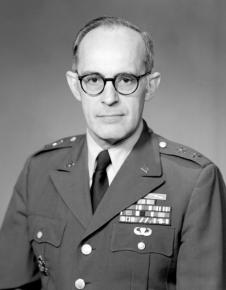The Democrats’ favorite general
, a member of Iraq Veterans Against the War, looks at the pro-war life of the "antiwar general," William Odom.
THREE-STAR GEN. William Odom died unexpectedly of a heart attack on May 30. In recent years, Odom had become the darling of some segments of the antiwar movement for his calls for troop withdrawal from Iraq and criticism of the Bush administration's domestic wire-tapping program.
Odom was the perfect patriot poster-child to be chosen by House Speaker Nancy Pelosi (D-Calif.) to deliver the Democratic Party response to Bush's weekly Saturday radio address last April.
Speaking with characteristic bluntness, Odom blasted Bush's war policy: "To put this in a simple Army metaphor, the commander-in-chief seems to have gone AWOL, that is 'absent without leave.' He neither acts nor talks as though he is in charge. Most Americans suspect that something is fundamentally wrong with the president's management of the conflict in Iraq. And they are right."
Yet missing from the Odom-mania in the liberal blogosphere and among Democratic Party politicians was any critique of the full spectrum of what the general stood for.

If Odom was a dove, then watch out for his talons. His antiwar rhetoric didn't match his 30-plus years of military service as a committed Cold War hawk. Odom graduated from West Point and advanced in the officer corps by overseeing the policy of "Vietnamization"--substituting American-trained Vietnamese military forces for U.S. troops--in the early 1970s.
He became known as an expert on Soviet affairs. He argued for confrontation with the USSR and was known as a hardliner for his opposition to detente. According to the New York Times, the USSR invasion of Afghanistan in 1979, which hardened relations between the superpowers, brought Odom to do "some joyous ice skating" over the vindication of his policy aims.
Under President Jimmy Carter, Odom served as military assistant to Zbigniew Brzezinski, now one of Barack Obama's foreign policy advisers, and was the architect of what became known as the Carter Doctrine, which established the right of the U.S. to intervene militarily to protect its interests in the Persian Gulf and the Middle East region.
Carter-Brzezinski-Odom created a highly mobile Rapid Deployment Force (RDF) to place U.S. troops and materiel in the Middle East and Southwest Asia at a moment's notice, which was considered essential to provide muscle for the Carter Doctrine at a time when countries in the Persian Gulf were skeptical about allowing the U.S. to create permanent military bases on their soil.
The RDF evolved into the U.S. Central Command (CENTCOM)--which led 1991's Operation Desert Storm, the invasion of Afghanistan and the current invasion and occupation of Iraq.
In 2006, in the Journal of Cold War Studies, Odom published a glowing tribute to the foresight of the Carter administration for establishing CENTCOM, arguing that Carter's military build-up made possible the military successes of Desert Storm and Afghanistan, and that "CENTCOM's future is likely to include several more major military operations as well as dozens of small ones."
ODOM RIGHTLY called Iraq the "greatest strategic disaster" in U.S. imperial history; however, his calls for withdrawal were meant to better enable the U.S. to pursue its strategic interests in the region.
As he put it in his testimony before the Senate Foreign Relations Committee on Iraq last April, "The only sensible strategy is to withdraw rapidly, but in good order. Only that step can break the paralysis now gripping U.S. strategy in the region. The next step is to choose a new aim, regional stability, not a meaningless victory in Iraq...Withdrawal from Iraq does not mean withdrawal from the region. It must include a realignment and reassertion of U.S. forces and diplomacy that give us a better chance to achieve our aim."
In other words, Odom was committed to U.S. hegemony in the region, but through different means. While calling for a withdrawal from Iraq, Odom was making clear that control of the region based on U.S. economic interests remains the strategic imperative. His strategy called for more engagement with Europe and the other major powers based on restoring regional stability, but he also planned on keeping forces deployed in the region through CENTCOM in case of any potential future threats.
Those in the antiwar movement would do well to remember the sage advice given to me as a private in the Marine Corps: Beware of anyone with bars or stars on their collars. We don't need a general to justify our call for immediate withdrawal.
Odom's entire career and his continuing devotion to U.S. domination of the Middle East demonstrate the extent to which both parties agree on the larger project of U.S. imperialism, even as they differ on the best ways to pursue such goals.
Rather than mourn a general who is responsible for death and destruction throughout the Middle East and Southeast Asia, we're better served by returning to grassroots mobilization and taking to the streets.


